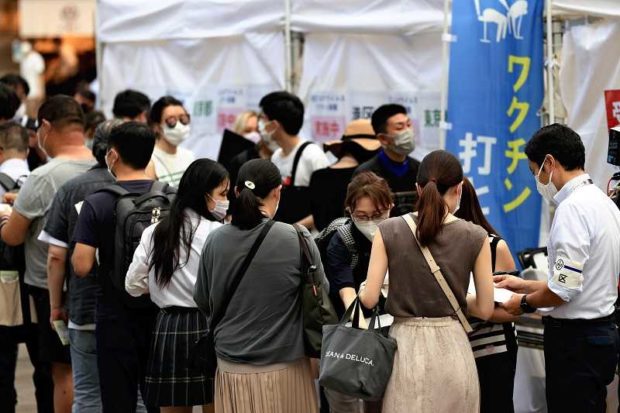
People wait in line at a temporary vaccination facility in front of JR Shinbashi Station in Tokyo on Thursday. | PHOTO: The Yomiuri Shimbun
TOKYO — The number of people visiting COVID-19 vaccination facilities has surged amid the seventh wave of the coronavirus pandemic, especially among younger generations, whose uptake of booster shots has been low.
August has been designated vaccination awareness month, with the central and local governments establishing reservation-free vaccine sites and expanding capacity at large-scale facilities.
“I kept putting it off because I couldn’t make a reservation near my house on Saturdays and Sundays,” said a 33-year-old man from Katsushika Ward, Tokyo, who got his third shot at a temporary vaccination facility in front of JR Shimbashi Station on Thursday evening.
“The infection is spreading rapidly, so I’m glad that I could get vaccinated to protect myself,” he said.
The facility, which was operated by the Tokyo metropolitan government, was open on Thursday and Friday for three hours in the evening, and commuters were able to get vaccinated without an appointment on their way home.
All 100 slots were filled on Friday, and over the two days, vaccinations were administered to 146 commuters, including young people.
The booster rollout started in December and 63% of people nationwide have received three doses of a COVID-19 vaccine. However, the figure is 52% among people in their 30s, 48% among people in their 20s and 34% among people aged 12-19. Meanwhile, people under 40 account for 60% of infections in the latest wave of the pandemic, making vaccinations of younger generations an urgent priority.
The low booster uptake among the younger generation stems partly from a fear of adverse effects such as fever.
“After the first and second shots, I had a high fever, which affected my work,” said a woman in her 30s from Saitama Prefecture. “Getting a shot on a weekday is problematic because of work, but I don’t want to spend my precious weekend getting vaccinated as I want to rest on those days.”
In an online survey conducted by Tokyo-based NLI Research Institute in March, 500 people were asked why they were reluctant to get the third shot: 48% of the respondents said they were worried about adverse reactions, 20% said two shots were enough, and 12% said it was too much trouble.
“The central and local governments should provide detailed explanations about the efficacy and adverse effects of the vaccines to ease people’s concerns. At the same time, they must create an environment that facilitates vaccinations,” said NLI analyst Yoko Muramatsu.
The Health, Labor and Welfare Ministry designated August vaccination awareness month and is distributing leaflets across the country with information touting the effectiveness of booster shots in preventing infections and the onset of COVID-19.
According to the Prime Minister’s Office, 490,000 people received their third vaccine dose in the week ending Friday, up from 190,000 in the preceding week, and 210,000 two weeks earlier.
Over the weekend, people without reservations formed long queues at mass vaccination sites at the Tokyo metropolitan government building and in front of Tokyo Station, among other locations.
Nagoya City opened a reservation-free vaccination site at a commercial complex in late July, and Okinawa Prefecture is preparing to open such facilities at two universities. Kanazawa City has increased the capacity at mass vaccination sites from 300 shots per day to 400.
RELATED STORIES
Japan shifts to ‘living with coronavirus’ strategy
Japan logs all-time high COVID-19 cases
Japan marks most weekly new COVID-19 infections globally with 970,000 cases